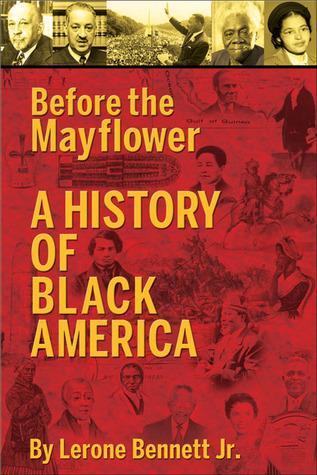Book: Before the Mayflower: A History of Black America by Lerone Bennett Jr.
Genre: History
Publisher: Johnson Publishing Company
Publication date: 2007
Pages: 804 (including over 200 pages “Landmarks and Milestones” in a timeline format)
Source: Library

Before the Mayflower by Lerone Bennett Jr. was a selection for our Diversity Club, discussed during two meetings because it covers such a broad sweep of history.
Summary: Before the Mayflower: A History of Black America begins with Ancient Egypt and the flourishing of sub-Saharan African Kingdoms while Europe languished in the Middle Ages. The story continues with the first Africans to arrive in the future United States, in Jamestown one year before the Mayflower landed at Plymouth Rock. From there, the book tells the engaging 400-year history of Black America.
Thoughts: If you watched The African Americans: Many Rivers to Cross, the PBS show that Henry Louis Gates, Jr., Before the Mayflower: A History of Black America makes an excellent companion book. If you haven’t seen that show or read this book, your understanding of American history has enormous gaps. Many of my notes while reading Before the Mayflower were variations on one question: Why wasn’t I taught this in school?
I learned about Crispus Attucks as the first to die in the Revolutionary War, but I didn’t know how much of a leadership role he took in that early engagement.
I learned about Nat Turner but not about the repeated rebellions all during the period of enslavement.
I learned about the French Revolution but not the Haitian one.
My Presbyterian upbringing made sure that I was well-versed in the history of the various Protestant denominations but I never learned about the history of the Black Church, even though there was an AME church in my small town.
The Reconstruction I was taught was written by Southern apologists — I’ve known that for awhile. But, I didn’t know how much I was missing in my understanding of The Reconstruction. I didn’t know the glorious speeches by the white Thaddeus Stevens much less the brilliant one by Robert Brown Elliott, a black man with a mysterious background but apparently free before the Civil War and certainly well-educated. I didn’t know about the continued war against the formerly enslaved, especially on election days in polling locations, complete with cannons.
While reading this book I felt that I was invited, even though I’m white, to admire and identify with the spirited blacks who never gave up on the best of what the United States professed itself to be. This brought up some intriguing questions. What if all Americans embraced all of American history? What if we accepted both the cruelty of slave masters and the resiliency of the enslaved as our history, no matter where our ancestors came from or how they got here or when they arrived? Does that get us to a place of greater common interest?
Our Diversity Book Club discussed this book over two sessions since it covers such a broad sweep of history. Our second discussion was last night. Going to book club last night, for me, was the perfect way to honor the moment that the world observed the life of Nelson Mandela. Here’s what Before the Mayflower had to say about African-Americans and Nelson Mandela:
African-Americans showed the same spirit and the same panache by going to jail in droves not for their freedom but the freedom of their South African Brothers and Sisters. In one of the finest hours of the African-American adventure, African-Americans, supported again by sensitive Whites, defeated almost the whole of the American corporate structure by leading a divestiture campaign that forced most corporations to get rid of stock in South African companies.
Encouraged by this success, African-Americans, led by the Congressional Black Caucus and TransAfrica, created a sea change in American foreign policy by forcing passage over Ronald Reagan’s veto of an act that imposed strict economic sanctions on the South African government. This act virtually assured the freedom of South Africans, as Nelson Mandela acknowledged in his tumultuous swing through American cities. (p. 424)
Appeal: Before the Mayflower is for anyone who values the concepts of equality and freedom encoded in the founding documents of the United States of America.
Have you read this book? What did you think?

